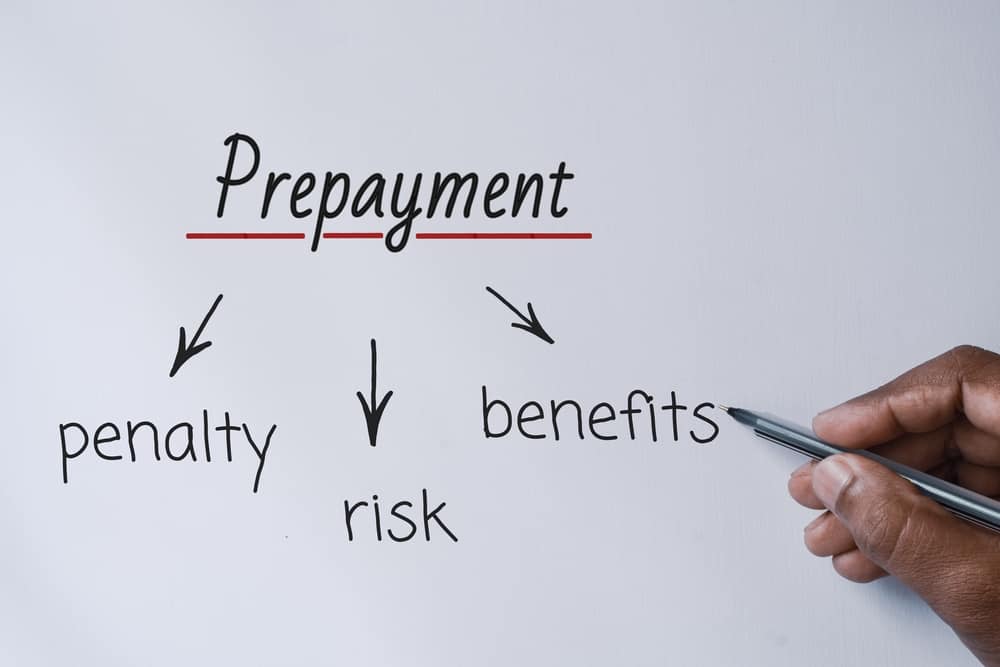This guide will show you what counts as a business prepaid expense in the UK, how to record one in your cash account, and the penalties you can incur.
The Definition of Prepayment
A prepayment is as straightforward as it sounds. If you pay for a bill before the due date stated on the invoice, then you’ve made a prepayment. You can make a prepayment for bills, operating expenses, or non-operating expenses.
However, despite their simplicity, there are several different ways a prepayment can be made. Plus, you could even incur a prepayment penalty in certain situations.

What Can You Make a Prepayment On?
As a corporation, there are several things you can make a prepayment on. Basically, any form of debt that your business has gained can be paid off as a prepayment. Besides paying off business loans early, this includes paying for your lines of credit, wages, rent, and goods and services.
When a corporation uses a prepayment to cover goods, any item purchased is considered a current asset. Once the good or service has been used, the current asset gets reclassified as a regular expense.
Other Types of Prepayments
Besides corporate prepayments, you can also get individual prepayments as well as tax prepayments within the world of business.
Individual prepayments
Individuals within a corporation can also make their own prepayments. For example, if an individual uses a credit card, they may end up prepaying their credit card balance.
Taxpayer prepayments
Although it may not seem like it, you are making prepayments whenever you pay taxes. Tax day normally falls on the 15th of April each year. Whenever you pay taxes on this day, you’re paying for them in advance for the next year.
Prior to the 15th of April, business-owning taxpayers need to calculate how much they owe and pay the calculated amount to HMRC (as shown in this calculating taxable profits article by Gov.UK). Calculating how much tax you can be done through traditional accounting or cash basis accounting.
If you don’t prepay any tax (or don’t pay enough), you will incur penalties. On the other hand, if you pay too much tax, the excess will be paid back to you through a tax refund.
Prepayment Penalties
Although paying back a business loan long before the due date shouldn’t be a reason for being penalized, it sometimes is. Banks give out loans in order to profit off the interest you pay. If you pay your loan back too early, the bank won’t have gained enough interest from you.
Some banks will impose a prepayment penalty in some instances of early repayments. This way, the banks can still make money through lending.
Before you make a prepayment, you should check your repayment schedule.
Prepayment Accounting and Balance Sheets
Whenever you make a prepayment, you need to record it in a specific way on your company’s balance sheet.
Start by recording the invoice or the payment when you receive it onto a prepayments balance sheet. When you receive the goods, you can move the prepayment over to your profit and loss account. The paying off of the prepaid expense will then be classed as a day-to-day running cost.
If you have not received the goods by the end of the financial year, they should be recorded as prepayments on the balance sheet. They should not be recorded as costs on the profit and loss account.
It’s important not to record a prepayment on your balance sheet as a lump sum, even if you record it accurately in the month you made the payment. Your profit margins and income statement will be affected and it will reflect poorly on your cash flow.
Final Thoughts
Prepayments are when you pay in advance for goods, services, or other assets to use within a future period. Instead of spreading the cost over several months up until the repayment deadline, you can cover the entire cost before it’s due.
Whether you need to make a prepayment at an individual, tax-payer, or corporate level (or pay for an operating or non-operating expense in advance), you should hire an accountant to take care of the process for you.
Also see: Top 21 UK Prepaid Business Expense Cards
Sources:
https://gocardless.com/guides/posts/what-is-a-prepayment/
https://www.investopedia.com/terms/p/prepayment.asp
https://www.freshbooks.com/en-gb/hub/payments/what-is-a-prepayment